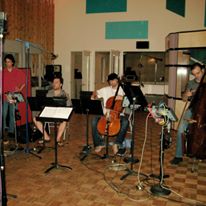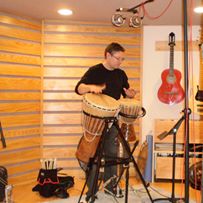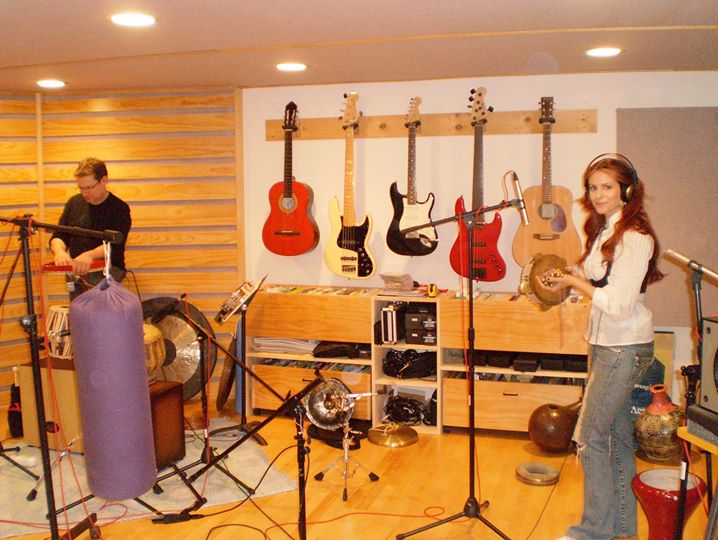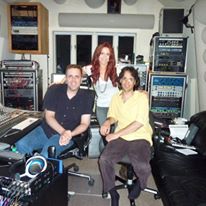Victoria Faiella’s version of War Pigs taps into middle eastern themes and instrumentations. These changes reflected the song’s lasting relevance when it was recorded in 2011, and expressed Faiella’s sorrow around the wars in Iraq and Afghanistan. The Black Sabbath intro was replaced with floating middle eastern melodies.
Keep reading for the original blog.
Full story:
The third track on my SoundCloud Playlist is “War Pigs” by Victoria Faiella.
This can also be heard on YouTube:
In her feature on Limelight’s now extinct Song Clearance website, Victoria explained why we included a cover of Black Sabbath’s “War Pigs” on her Wild Butterfly CD:
The wars in Afghanistan and Iraq were weighing heavily on my heart & mind. Like so many people, I too was often debating the issues with family and friends. One morning as I was having a cup of coffee getting ready to start my day I found myself singing the timeless Black Sabbath song War Pigs. I was profoundly struck and saddened by how relevant the lyrics still are to this day… so many years later. I knew that I wanted to include one cover on the newest CD that I was getting ready to record and believed it was going to be a top contender. After discussing the option of covering the song with my producer Barry Hartglass we knew we wanted to somehow reinvent it and modernize it in a way that reflected the timeliness of the lyrics and still fit in cohesively with the rest of the material on the CD. The end result is a Middle-eastern styled version of the song, stripped down to voice, a string quartet, fiddle, world percussion and some Middle-eastern instruments – the Persian Santur, Duduk & Zourna being most noteworthy. Changing the original line, “In the fields are bodies burning” to “In the desert bodies burning” further drives home the point and undoubtedly refers to our modern day world issues.
The idea of “Middle-eastern styled arrangement with string quartet” was definitely a unique concept and to me this justified the creation of yet another version of this song, as several remakes have already been recorded.
The first thing I did was transcribe all of the parts from the original Black Sabbath version and then considered what sections and parts would be used and how I would transform them to work with our concept.
I decided not to use Black Sabbath’s intro and created a new intro instead. I took the guitar riff from 5:44 on Black Sabbath’s version and had a Persian Santur sound play that part. I looped it in the intro for 16 measures. The Persian Santur samples I used in my Kontakt sampler were created by Precisionsound. Also, for the intro, I found and modified a couple of cool drum and percussion loops from Spectrasonics’ Stylus RMX and elsewhere. And there are some Gong sound effects too… Originally there was a dumbek loop in there too, and this was ultimately replaced when Dave Anthony recorded all of the live percussion later.
I copied the form from Black Sabbath’s version from 0:52 – 4:19 and programmed some temporary drums. During the solo section, I added a sitar drone from the virtual instrument, East West Quantum Leap Ra. Instead of using Black Sabbath’s sections from 5:44 on, I used my intro sounds again for the ending. At this point, the form for my arrangement was mapped out.
 I recorded Jason Crosby doing his fiddle solos in my studio while he was also here for organ overdubs on some of the other songs for the CD. We originally only intended to have fiddle in the intro (and the ending) and in the solo section. For the solo section, I transcribed the first part and the end of the Black Sabbath electric guitar solo, and so Jason played those notes. but he improvised his own thing in between. For the last measure of his solo I wrote “go wild” and he did! For his improvising throughout, I had Jason use the E Phrygian Dominant scale. What is that? An E Phrygian mode is the third mode of a C Major scale. In other words, if you played a C Major scale (C D E F G A B) but started from the third scale degree (E) it is called E Phrygian: E F G A B C D. Another way to look at it is to compare it to the E major scale (E F# G# A B C# D#). In comparison, E Phrygian has a flat 2, a flat 3, a flat 6 and a flat 7. E Phrygian Dominant, however, has a major third (G#) like the E major scale, but the flat 2, flat 6 and flat 7 remain. The scale is E F G# A B C D. I chose this because just about any melody you improvise with this particular scale will sound middle-eastern.
I recorded Jason Crosby doing his fiddle solos in my studio while he was also here for organ overdubs on some of the other songs for the CD. We originally only intended to have fiddle in the intro (and the ending) and in the solo section. For the solo section, I transcribed the first part and the end of the Black Sabbath electric guitar solo, and so Jason played those notes. but he improvised his own thing in between. For the last measure of his solo I wrote “go wild” and he did! For his improvising throughout, I had Jason use the E Phrygian Dominant scale. What is that? An E Phrygian mode is the third mode of a C Major scale. In other words, if you played a C Major scale (C D E F G A B) but started from the third scale degree (E) it is called E Phrygian: E F G A B C D. Another way to look at it is to compare it to the E major scale (E F# G# A B C# D#). In comparison, E Phrygian has a flat 2, a flat 3, a flat 6 and a flat 7. E Phrygian Dominant, however, has a major third (G#) like the E major scale, but the flat 2, flat 6 and flat 7 remain. The scale is E F G# A B C D. I chose this because just about any melody you improvise with this particular scale will sound middle-eastern.
Anyway, once we heard how great Jason sounded on this song, we thought that he should also play in between the verses too where there would eventually be the string quartet. But I didn’t have anything for him to play along with yet in those sections except some percussion. But this was not a problem for Jason as he is an exceptional talent. Clearly a virtuoso musician. He played brilliant solos without any pitch reference. I played a few chords on the piano against his recorded solos to see how he did and everything he played was perfectly in tune and always the right notes. Amazing!
The next thing to do was for me to arrange the string quartet parts. We knew we were going to do a lot with a string quartet on this CD. A traditional string quartet consists of a first violin, a second violin, a viola and a cello. But because I arranged Victoria’s song “Atala” years ago with a quartet consisting of violin, viola, cello and bass, and wanted to re-record “Atala” and also “Atala-cize” several of her songs with this specific ensemble, that was going to be the string quartet for the album. And it worked out especially well having the bass in the quartet for “War Pigs” instead of a second violin. During and in between the vocal sections, the strings are basically playing the Black Sabbath guitar and bass parts with some additonal harmonies added. In the intro, the strings are playing new lines that I created, using the E Phrygian Dominant scale, of course, and also a phrase from the solo section. They are intentionally sliding from note to note which, to me, gives their part sort of a Hebraic or Arabic flavor. Versatile, contemporary musicians were required for this CD! Not only was it was important that the string players play in a beautiful classical style for some of the songs, but they also needed to convincingly rock out on “War Pigs.”

A perfect ensemble was assembled:
Antoine Silverman – Violin
Jonathan Dinklage – Viola
Dave Eggar – Cello
Gregg August – Double Bass
I recorded the strings at Systems Two Recording Studio.
To further exaggerate the Middle-east sound, I added a duduk and a zourna part. Both sounds are from the virtual instrument, East West Quantum Leap Ra. The duduk plays for the first time at 0:43 right after the intro and before Victoria first starts singing. The zourna plays for the first time at 1:58 right before Victoria sings about “Politicians.” You may not realize this, but the zourna part I played is actually taken from Black Sabbath’s electric guitar theme (in the E Aeolian mode) towards the end of their recording. Specifically, at 6:35.  E Aeolian is the sixth mode of G Major. In other words, if you played a G Major scale (G A B C D E F#) but started from the sixth scale degree (E) it is called E Aeolian: E F# G A B C D. I took their E Aeolian theme and converted it to E Phrygian Dominant to go with the Middle-eastern vibe established throughout. Every F# became F and every G became G#.
E Aeolian is the sixth mode of G Major. In other words, if you played a G Major scale (G A B C D E F#) but started from the sixth scale degree (E) it is called E Aeolian: E F# G A B C D. I took their E Aeolian theme and converted it to E Phrygian Dominant to go with the Middle-eastern vibe established throughout. Every F# became F and every G became G#.
It was time for live drums and percussion. Dave Anthony came to my studio and I recorded him playing drums. Victoria choked the crash cymbal hits to make it easier for Dave concentrate on the hi hats!

Dave also played a number of world percussion instruments – dumbek (replacing my loop), djembes, tabla, bayan, riq and frame drum (while Victoria played Indian bells).

I recorded Victoria’s vocals at The Barber Shop Studios using a vintage Neumann M269c tube mic. This was the winner of the crazy 9 mic shootout we had! The preamp was a Neve 1073 DPA and the compressor was an Empirical Labs Distressor.

Peter Moshay completed the mix at A-Pawling Studio (Pawling, NY).
For more info about Victoria and her music, please visit her website: www.victoriafaiella.com
